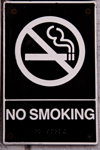 We all know smoking is bad. But just how bad is it? Tar coats your lungs like soot in a chimney. Lung cancer from smoking is caused by the tar in tobacco smoke. The carbon monoxide in smoke robs your muscles, brain and body tissue of oxygen, making your whole body and especially your heart work harder. Despite these health risks, many, many people choose to smoke anyway.
We all know smoking is bad. But just how bad is it? Tar coats your lungs like soot in a chimney. Lung cancer from smoking is caused by the tar in tobacco smoke. The carbon monoxide in smoke robs your muscles, brain and body tissue of oxygen, making your whole body and especially your heart work harder. Despite these health risks, many, many people choose to smoke anyway.
Now, scientists have determined that cigarettes start to destroy a smoker’s DNA within minutes of inhaling. What this means is that we now have proof that the habit causes immediate genetic damage, quickly raising the short-term risk for cancer.
Researchers from the Masonic Cancer Center and department of pharmacology at the University of Minnesota in Minneapolis conducted a study where they focused on a class of cancer-causing agents found in cigarette smoke called “polycyclic aromatic hydrocarbons,” or PAHs.
PAHs are known to inflict damage on DNA. For that reason, they are thought to play a large role in the onset of lung cancer. It is estimated that lung cancer causes the loss of 3,000 lives a day worldwide, mostly as a consequence of smoking.
But no-one had yet determined the exact mechanism by which PAH exposure causes the disease. To figure out the link, scientists labeled and tracked a single PAH — phenanthrene — through the bodies of 12 volunteer smokers.
This was the first time an investigation was done to track the metabolism of a PAH specifically delivered by inhalation in cigarette smoke, without interference by other sources of exposure such as air pollution or the diet.
The results from this experiment proved to be rather frightening. The PAH rapidly transformed into a known toxin. It then proceeded to cause havoc on the DNA of the smokers within just 15 to 30 minutes after smoking!
The speed at which the cancer-causing process happened surprised even the research team. They said that the rate at which the whole process unfolded was comparable to having injected the PAH directly into an individual’s bloodstream.
If you are a smoker, this could the impetus you need to stop this unhealthy habit. If you would like to quit, contact your healthcare provider. He or she can help you find the best approach — and direct you towards the many programs that are available to assist in breaking the habit.
